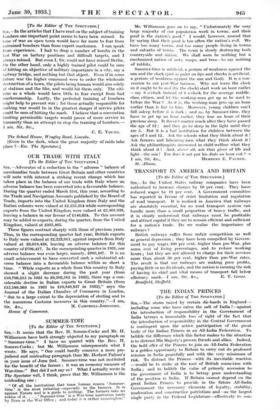SUMMER-TIME [To the Editor of Tax SeEcrvroa.]
Sut,—It seems that the Rev. H. Somers-Cocks and Mr. H. Williamson have both strongly objected to my paragraph on "Summer-time." I have no quarrel with the Rev. H. Somers-Cocks ; but Mr. Williamson misrepresents what I wrote. He says, "One could hardly conceive a more pre- judiced and misleading paragraph than Mr. Herbert Palmer's in your issue of June 2nd. Summer-time was not instituted for the benefit of the farmer ; it was an economy measure of War-time." But did I not say so? What I actually wrote in The Spectator will, -I think, prove that Mr. Williamson is the misleading one :
" Of all the institutions that tease human reason 'Summer- time' is the most irritating—especially to the farmers. It is against Nature and is a guide to nothing. The farmers take no notice of it. . . . Summer-time ' is a War-time institution made by Dora or the War Office ; and today it is rather meaningless." Mr. Williamson goes on to say, "Unfortunately the very large majority of our population work in towns, and their good is the nation's good." I would, however, amend that by saying that their good is too often the nation's evil. We have too many towns, and too many people living in towns and suburbs of towns. The town is slowly destroying both countryside and nation. We shall soon be nothing but a mechanized nation of ants, wasps, and bees—to say nothing of rabbits.
Summer-time is artificial, a gesture of weakness against the sun and the clock (just as paint on lips and cheeks is artificial, a gesture of weakness against the sun and God). It is a con- cession to our post-War laziness. Why not leave the clock as it ought to be and (by the clock) start work an hour earlier —say 8 o'clock instead of 9 o'clock for the average middle- class citizen, and let the working-man get up as he used to before the War ? As it is, the working-man gets up an hour earlier than is fair to him. Moreover, young children can't fall asleep before it is dark ; and as, by Summer-time, they have to get up an hour earlier, they lose an hour of their precious sleep. It doesn't matter much after they have passed the age of 12; and they go to sleep in the light until they are 5. But it is a bad institution for children between the ages of 5 and 12. Ask the schools what they think about it I Ask farmers and labouring-men what they think about it ! Ask the philanthropists interested in child-welfare what they think about it ! And, above all, ask that giver of life and light—the sun I For does it not put his dials an hour out ?--•










































 Previous page
Previous page